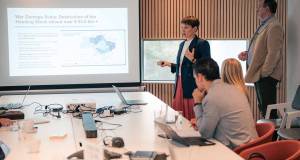- Opinion
- Posted
A Better Way To Invest?

Richard Douthwaite investigates pensions and better ways to invest in our future
As everyone knows, since fewer babies are being born in Ireland and people are living longer, there are going to be proportionately fewer people of working age to support the pensioners of the future. As a result, those at work in thirty years' time will see a higher proportion of their incomes going to support the retired than is the case at present. That is, unless something can be done to lighten their burden. So can it?
About five years ago, there was considerable support for an idea developed by Charlie McCreevy, then the Minister of Finance, which he thought would solve the problem. This was that if 1% of Ireland’s national income was invested each year, the income from the investments would cut the amount of tax that had to be collected to pay pensions in the future. When Mr McCreevy set up the National Pensions Reserve Fund (NPRF) to implement the idea, lots of articles appeared praising his bravery and foresight.
But will the idea work? At the end of October 2004, €10, 778,300,000 had been invested in the fund, so there’s a lot of money riding on its success. Of this money, 74.2% has been invested on the world’s stock markets in company shares. The rest is in cash or in eurozone bonds.
There are two problems with this sort of investment. Firstly there are the risks that the country is taking with this huge sum of money, some of which are long-term. For example, given what we know about the massive changes that are going to take place as a result of oil and gas depletion (which I wrote about in the last edition of Construct Ireland), can we assume that the world economy will continue to grow and take the value of the shares that the NPRF has bought with our money up with it?

Other risks are short-term. 31% of the shares that the NPRF holds are in North American companies. As I write, the dollar seems to be on the verge of falling even more rapidly than it has done so far this year and many investors must be saying to themselves “perhaps we’d better sell our shares quickly and turn the dollars we get for them into euros or sterling before the dollar slips any more”. Half the world’s savings have been invested in the US and the moment more foreign investors start trying to get their money out than are putting it in, Wall Street and the dollar will drop, spurring others to take their money out too. Panic will set in as people rush for the exits. The value of shares and the dollar will plummet to very low levels indeed, wiping out a big chunk of our savings.
But there are more fundamental problems than these with the McCreevy strategy. The basic one is that he – and his advisors – just did not understand how pensions work. As a result, they thought that a savings strategy which, if the markets hold up, might make sense for an individual, is suitable for the nation as a whole. It is not, unless it is very carefully thought out

To see why this is so, let’s ask the basic question - Why do we need pensions? For the food, clothing, light and heat, transport, entertainment, house repairs and medical care we'll need when we retire. But, since we can't eat money, all these things will have to be provided for us by our children's generation unless we start stashing away tins of baked beans, gallons of petrol and warm overcoats in the attic now. No-one is about to do that but even if we did, there's certainly no way that we can get our own generation to provide today the personal care and the other services we'll require three decades hence so that we can get them stored away.
Consequently, the present, much-derided method of providing for pensions, pay-as-you-go, which involves each generation looking after the one before it by paying through its taxes for its old people’s care, makes perfect sense. At least it is direct and efficient, avoiding all the expensive middlemen involved in the share-dealing game.
The shares that the NPRF holds can only help pay pensions in the future if either the dividends paid by the companies are used that way, or if the shares are sold and the capital paid out. In either case, the younger generation is providing the resources for the old to spend. In the first example they do so by working and making the profits that are paid out in dividends, and in the second, they buy the shares which the older generation’s pension funds are selling off.

The proportion of persons of working age relative to those over 65 years of age is projected to fall from a current 5:1 ratio to less than 2:1 by mid-century.
There is another problem with share sales in the future, even if the global economy does well. Share prices are reckoned to be historically high now in Britain, the US and some other countries because the big post-war baby-boom generation has reached the age at which it is saving as much as it can before it retires. The generations coming along after the boomers are smaller, and so there will be fewer people wanting to take over these shares when the baby-boomers want to sell them off, and the prices will fall. Has the NPRF a plan for dealing with this problem?
In theory, there are only three ways that money we save now can ease the burden we place on our children. One is via economic growth. If the economy expands, the proportion of national income required to provide pensions with the same purchasing power as they have today will fall. But, quite rightly, the Irish government has ruled this solution out because our politicians accept that people drawing their pensions in thirty or forty years' time shouldn't be asked to managed on today's level of provision if everyone else's incomes have gone up.
Paying today's pensions tomorrow would consign pensioners - in other words, us - to relative poverty as our spending would no longer be able to match that of the rest of the population. Our lives would become cramped and mean. We would feel less good about ourselves, become sicker more often and die earlier. Pensions therefore have to keep up with whatever everyone else is earning at the time. Moreover, even if we abandoned this principle, the prospects of continued global growth are pretty dubious these days and it would be most unwise to rely on it to solve the problem.

The second way that putting money aside today could theoretically ease the pension problem tomorrow is the one the NPRF seems to be implementing by investing almost all its money overseas. In future, the foreign earnings from these investments will be able to be spent on imports, thus relieving the next generation of the need to make things to export to pay for a proportion of the goods they bring in. In other words, rather than caring for our old people ourselves, we will become rentiers and get foreigners to make the goods they'll require. It's a plan that might work if, internationally, things stay much the same as they are today. However, remember that we are looking 30-50 years ahead and that something as minor as a major currency re-alignment in that period could wipe out all the gains.
The third way is much better. It is that we invest the fund in Ireland in such a way that, while our children have to spend more of their time working to look after us than we currently have to spend on supporting our retired parents and grandparents, they will need to spend less time on other things. So, for example, if we build better buildings that need less heat and maintenance, there will be less for our children to do towards their upkeep and they will be able to afford to spend more time looking after us.
Similarly, if we build a decent public transport system so that the next generation can manage without running a second car, or even a first one, that will provide them with appreciable savings too. And if we anticipate some of the imports that are going to be really expensive in the future in terms of the amount of Irish production which will have to be sent overseas to pay for them and find ways that enable us - and them - to manage on less of these, that would save work too. I'm particularly thinking of fossil energy imports here. Investing the NPRF cash in wind farms and other forms of renewable energy could really pay off.
Another way of lightening our children's load would be to pay off Ireland's overseas debts. What we owe to ourselves doesn't matter - the money just shifts from one Irish pocket to another. Borrowing from foreigners does matter, though, because every year goods and services have to be made in Ireland and sold overseas to earn the euros to pay the interest on it. The National Treasury Management Agency estimates that at the end of 2003, foreigners held €21,000 million worth of Irish government bonds, so the NPRF money could pay about half of them off if it was not legally prevented from doing so.
I think Ireland should pay off its debts before it speculates on the world’s stock markets. The NPRF investment strategy should therefore be to get out of debt to foreigners and then to initiate or back projects here that would make the Ireland of the future a low-cost, more sustainable place to run. As the construction industry would gain enormously from such a course, everyone in the sector should start discussing the NPRF’s mistaken policies with their political representatives. Now that Mr McCreevy has gone to pastures new, radical changes should be possible.
__________________________________________
Richard Douthwaite is an economist associated with Feasta, the Foundation for the Economics of Sustainability, See www.feasta.org
Related items
-
New scheme offers up to €75,000 retrofit loans at low cost
-
EIB Group support new low-cost home energy upgrade scheme in Ireland
-
 EU project aims to accelerate market for green homes
EU project aims to accelerate market for green homes -
 Green loan rate for new HPI-certified housing
Green loan rate for new HPI-certified housing -
 Towards greener homes — the role of green finance
Towards greener homes — the role of green finance -
 An Post to enter retrofit market
An Post to enter retrofit market -
 Passive house costs falling, new study finds
Passive house costs falling, new study finds -
 Bank of Ireland unveils new green loans
Bank of Ireland unveils new green loans -
 New retrofit finance available in Waterford
New retrofit finance available in Waterford -
Cutting oil dependecy
-
Retrofitting investment
-
On the money

